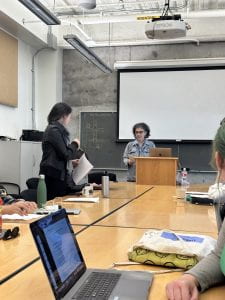Slugs Embrace Yolo @ CAMP[8]
Santa Cruzans migrated en masse to Yolo County last weekend for CAMP[8], to participate in the eighth edition of the California Meeting on Psycholinguistics, held at UC Davis from Nov 14-16. CAMP featured presentations (in chronological order) from Matt Wagers (“Hands-on LLM Tutorial”, with Rachel Ryskin), Matthew Kogan & Ruoqing Yao (“Sources of distortion and confusion in distributed representations of morphosyntactic structure”, with Wagers) & Cal Boye-Lynn (“A Fricative by Any Other Name: A Close Replication of Shinn & Blumstein (1984)”, with Grant McGuire & Amanda Rysling).
It also featured encounters with a number of barn-yard animals, like a Muscovy duck (pictured), some friends from UCLA (also pictured), and near-collisions with Davis’ famously numerous cyclists (imagined anxiously).































